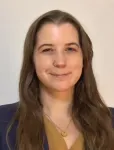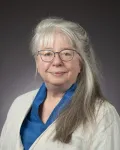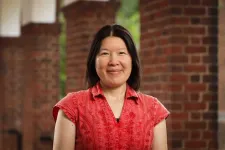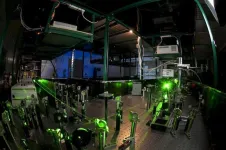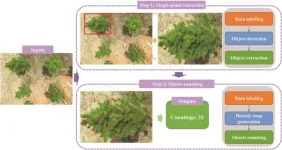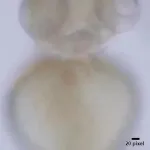(Press-News.org) The U.S. Department of Energy’s (DOE) Argonne National Laboratory has named five highly accomplished scientists as Argonne Distinguished Fellows in 2023. They are Glenn Decker, Paul Fenter, Robert Fischetti, Sven Leyffer and Valentine Novosad.
The honor recognizes scientists who have not only achieved international esteem but who have also demonstrated exceptional achievements in science or engineering relevant to Argonne’s core missions. They are leaders of major, complex, high-priority projects or programs that have an impact on the future of the Laboratory. Only a small percentage of the Laboratory’s research staff — about three percent — receive this distinction.
“Argonne’s distinguished fellows have a long track record of helping the Laboratory deliver on its mission of advancing America’s prosperity and security,” said Argonne Director Paul Kearns. “They are leaders in the scientific community, whose impactful research and publications continue to accelerate discovery.”
2023 Argonne Distinguished Fellows
Glenn Decker has worked at the Advanced Photon Source (APS), a DOE Office of Science user facility, for the past 33 years. He served as manager of the electron storage ring at the heart of the APS during its construction in the early 1990s and worked in a variety of capacities on that accelerator for its entire life. Decker’s specialty as the former accelerator diagnostics group leader found him dealing with detectors and systems responsible for stabilizing the X-ray beams generated by the APS storage ring at the level of thousandths of a millimeter.
For the past few years, Decker has been an associate project manager for the APS Upgrade project, working on the new storage ring that will replace the one he originally helped build. Decker’s decades of experience have proven invaluable to the upgrade, which will result in an improved APS with X-ray beams up to 500 times brighter than those generated by the original APS.
Paul Fenter is a senior physicist and group leader for interfacial processes in Argonne’s Chemical Sciences and Engineering division, and previously served as the director of the Center for Electrochemical Energy Science (from 2014 to 2020), a DOE-funded Energy Frontier Research Center.
His research probes the structure and reactivity of solid-liquid interfaces through the use and development of novel synchrotron X-ray scattering and imaging techniques at the APS, most notably reactions at mineral-water interfaces (i.e., “electrical double layer” structures) and electrode-electrolyte interfaces in energy storage systems (e.g., lithium-ion batteries and supercapacitors).
Fenter is a Fellow of the American Physical Society and is the winner of the 2012 Bertram E. Warren Diffraction Physics Award from the American Crystallographic Association and the Argonne National Laboratory Board of Governors’ Distinguished Performance Award. He is also a member of the American Chemical Society and Geochemical Society.
Robert (Bob) Fischetti is the life science advisor to the APS director and group leader of the National Institute of General Medical Sciences and National Cancer Institute Structural Biology facility (GM/CA). As head of these beamlines at the APS, Fischetti oversees the development and application of new capabilities to use APS’s very bright X-rays to investigate the structures of diseases, laying the groundwork for potential treatments and vaccines.
Fischetti is an expert in applications of synchrotron radiation including X-ray optics, beamline design, construction and operations. His experience with synchrotron radiation started in 1981 as a user at the Stanford Synchrotron Radiation Lightsource (SSRL) in California. Since then, he has built several instruments and full beamlines and applied a variety of X-ray techniques to study challenging problems in the biological and environmental sciences. Most recently, Fischetti was at the forefront of work at the APS to understand SARS-CoV-2, the virus that causes COVID-19. Much of what we know about the structure of that virus was learned using the APS.
Fischetti is a member of the American Crystallographic Society and is the recipient of an R&D 100 award.
Sven Leyffer joined the Mathematics and Computer Science division at Argonne in 2002, where he is now a senior computational mathematician. Leyffer is a Fellow of the Society for Industrial and Applied Mathematics and serves as its current president. He is also a Senior Fellow of the Computation Institute, a joint initiative between the University of Chicago and Argonne.
In 2006, Leyffer (along with two colleagues) received the Lagrange Prize in Continuous Optimization, which is awarded only once every three years. In 2016, he received the Farkas Prize from the INFORMS Optimization Society.
His research interests include developing reliable methods for solving large-scale nonlinear optimization problems in applications including experimental design, resilience of the power grid and inverse problems arising at the APS. He is extending nonlinear optimization methodologies to emerging areas, such as discrete optimization for topology design and optimization problems involving digital twins.
Valentine Novosad is a senior scientist and principal investigator in Argonne’s Materials Science division who also collaborates on projects with the Physics division. He is widely recognized for his interdisciplinary materials science and engineering research that spans from fundamental studies of magnetic and superconducting films and patterned heterostructures to their practical applications, such as in spintronics, cosmology, nuclear physics, quantum information science and nanomedicine.
He has co-authored over 280 technical papers, been awarded six patents and given numerous invited talks around the world. Novosad is actively involved in several major scientific collaborations across Argonne and beyond, including the South Pole Telescope, Electron-Ion Collider, and the International Cryogenic Underground Laboratory for Rare Events with Particle ID.
Novosad is a senior Institute of Electrical and Electronics Engineers Member, an elected Fellow of the American Physical Society, and a recipient of the Argonne Board of Governors Distinguished Performance Award.
END
Five researchers named Argonne Distinguished Fellows for 2023
A collection of accomplished scientists received the Laboratory’s highest rank for researchers
2023-12-15
ELSE PRESS RELEASES FROM THIS DATE:
Study shows exposure to household chemicals can lower odds of getting pregnant
2023-12-15
Exposure to phthalates, a group of plasticizing and solvent chemicals found in many household products, was linked to a lower probability of getting pregnant, but not to pregnancy loss, according to research by a University of Massachusetts Amherst environmental and reproductive epidemiologist.
The study, published this week in the journal Environmental Health Perspectives, also noted an association between preconception exposure to phthalates and changes in women’s reproductive hormones, as well as increased inflammation and oxidative stress.
“Phthalates ...
NRL’s Debra Rolison elected 2023 National Academy of Inventors Fellow
2023-12-15
WASHINGTON – Debra Rolison, Ph.D., of the U.S. Naval Research Laboratory (NRL) has been named Fellow of the National Academy of Inventors (NAI), for having demonstrated a highly prolific spirit of innovation in creating and facilitating outstanding inventions that have made a tangible impact on the quality of life, economic development, and welfare of society.
Rolison has been at the lab for over 43 years and heads the Advanced Electrochemical Materials section. The recognition by the NAI is attributed to the efforts made by her team’s inventions related to a new form factor for zinc anodes in rechargeable ...
North America’s first people may have arrived by sea ice highway
2023-12-15
SAN FRANCISCO — One of the hottest debates in archeology is how and when humans first arrived in North America. Archaeologists have traditionally argued that people walked through an ice-free corridor that briefly opened between ice sheets an estimated 13,000 years ago.
But a growing number of archeological and genetic finds — including human footprints in New Mexico dated to around 23,000 years old — suggests that people made their way onto the continent much earlier. These early Americans likely traveled along the Pacific coastline from Beringia, the land bridge between Asia and North America ...
Xinfeng Gao named 2024 AIAA Associate Fellow
2023-12-15
We are pleased to announce that the American Institute of Aeronautics and Astronautics (AIAA), a preeminent aerospace professional society, has selected professor Xinfeng Gao to be a member of the class of 2024 AIAA associate fellows. Only one member of the Institute for every 150 members is selected as an associate fellow each year by the review committee.
“This recognition illustrates the impact of our outstanding faculty. Aerospace engineering at UVA continues on a great trajectory and professor Gao is a big part of that,” said Richard W. Kent, professor and chair of the Department of Mechanical and Aerospace Engineering.
Pioneering ...
Substance-abuse stigma impedes treatment in various ways, scientists say
2023-12-15
Addiction is one of society’s most misunderstood and rebuked health conditions. That stigma discourages many people from seeking treatment for substance dependence, according to a new report published in Psychological Science in the Public Interest, a journal of the Association for Psychological Science.
Research on stigma toward people with substance use disorder (SUD) is relatively sparse, the report adds.
“Characterizing the nature and etiology of SUD stigma is critical for developing tailored and effective interventions ...
Ultrafast lasers map electrons 'going ballistic' in graphene, with implications for next-gen electronic devices
2023-12-15
LAWRENCE — Research appearing in ACS Nano, a premier journal on nanoscience and nanotechnology, reveals the ballistic movement of electrons in graphene in real time.
The observations, made at the University of Kansas’ Ultrafast Laser Lab, could lead to breakthroughs in governing electrons in semiconductors, fundamental components in most information and energy technology.
“Generally, electron movement is interrupted by collisions with other particles in solids,” said lead author Ryan Scott, ...
Revolutionizing forestry: 'CountShoots' unveils advanced UAV and AI techniques for precise slash pine shoot counting
2023-12-15
In southern China, the genetically improved slash pine (Pinus elliottii) plays a crucial role in timber and resin production, with new shoot density being a key growth trait. Current manual counting methods are inefficient and inaccurate. Emerging technologies such as UAV-based RGB imaging and deep learning (DL) offer promising solutions. However, DL methods face challenges in global feature capture, necessitating additional mechanisms. Innovations like the Vision Transformer and its derivatives (e.g., TransCrowd, CCTrans) show potential in plant trait counting, offering simplified and more effective approaches for large-scale and accurate ...
UMSOM researchers discover first ever link between hemoglobin-like protein and normal heart development
2023-12-15
BALTIMORE, December 14, 2023– In a landmark study led by the University of Maryland School of Medicine, researchers discovered for the first time that a certain kind of protein similar to hemoglobin, called cytoglobin, plays an important role in the development of the heart. Specifically, it affects the correct left-right pattern of the heart and other asymmetric organs. The findings, published today in the journal Nature Communications, could eventually lead to the development of new therapeutic interventions to alter the processes that lead ...
Facility fees charged by hospitals for colonoscopy procedures are about 55 percent higher than those charged by surgical centers
2023-12-15
EMBARGOED FOR RELEASE UNTIL FRIDAY DECEMBER 15 AT 11 A.M. EST.
U.S. hospitals charge facility fees for colonoscopy procedures covered by private health insurance that are on average approximately 55 percent higher than facility fees billed by smaller clinics known as ambulatory surgical centers, according to a study led by researchers at the Johns Hopkins Bloomberg School of Public Health.
The findings appear in a peer-reviewed research letter to be published online December 15 in JAMA Health Forum.
Colonoscopies ...
Racial equity in living donor kidney transplant centers
2023-12-15
About The Study: The results of this study of data on 57,000 adults who received living donor kidney transplants indicate that additional work is necessary to identify transplant program and center-level strategies to improve racial equity in access to living donor kidney transplant.
Authors: Lisa M. McElroy, M.D., M.S., of the Duke University School of Medicine in Durham, North Carolina, is the corresponding author.
To access the embargoed study: Visit our For The Media website at this link https://media.jamanetwork.com/
(doi:10.1001/jamanetworkopen.2023.47826)
Editor’s Note: Please see the article for additional information, ...
LAST 30 PRESS RELEASES:
Why chronic pain lasts longer in women: Immune cells offer clues
Toxic exposure creates epigenetic disease risk over 20 generations
More time spent on social media linked to steroid use intentions among boys and men
New study suggests a “kick it while it’s down” approach to cancer treatment could improve cure rates
Milken Institute, Ann Theodore Foundation launch new grant to support clinical trial for potential sarcoidosis treatment
New strategies boost effectiveness of CAR-NK therapy against cancer
Study: Adolescent cannabis use linked to doubling risk of psychotic and bipolar disorders
Invisible harms: drug-related deaths spike after hurricanes and tropical storms
Adolescent cannabis use and risk of psychotic, bipolar, depressive, and anxiety disorders
Anxiety, depression, and care barriers in adults with intellectual and developmental disabilities
Study: Anxiety, gloom often accompany intellectual deficits
Massage Therapy Foundation awards $300,000 research grant to the University of Denver
Gastrointestinal toxicity linked to targeted cancer therapies in the United States
Countdown to the Bial Award in Biomedicine 2025
Blood marker from dementia research could help track aging across the animal world
Birds change altitude to survive epic journeys across deserts and seas
Here's why you need a backup for the map on your phone
ACS Central Science | Researchers from Insilico Medicine and Lilly publish foundational vision for fully autonomous “Prompt-to-Drug” pharmaceutical R&D
Increasing the number of coronary interventions in patients with acute myocardial infarction does not appear to reduce death rates
Tackling uplift resistance in tall infrastructures sustainably
Novel wireless origami-inspired smart cushioning device for safer logistics
Hidden genetic mismatch, which triples the risk of a life-threatening immune attack after cord blood transplantation
Physical function is a crucial predictor of survival after heart failure
Striking genomic architecture discovered in embryonic reproductive cells before they start developing into sperm and eggs
Screening improves early detection of colorectal cancer
New data on spontaneous coronary artery dissection (SCAD) – a common cause of heart attacks in younger women
How root growth is stimulated by nitrate: Researchers decipher signalling chain
Scientists reveal our best- and worst-case scenarios for a warming Antarctica
Cleaner fish show intelligence typical of mammals
AABNet and partners launch landmark guide on the conservation of African livestock genetic resources and sustainable breeding strategies
[Press-News.org] Five researchers named Argonne Distinguished Fellows for 2023A collection of accomplished scientists received the Laboratory’s highest rank for researchers
